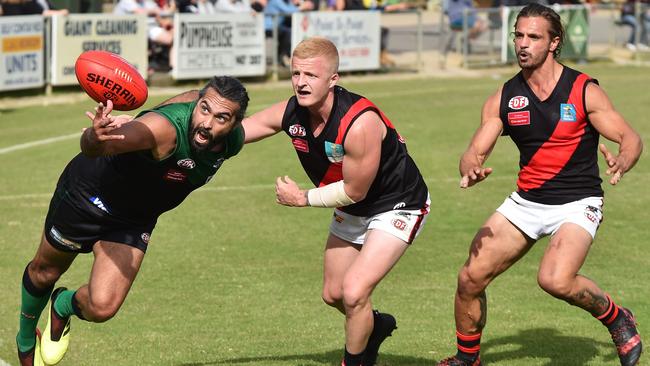EDFL 2020: Premier Division clubs preparing for salary cap cuts
Just months after a cut to the salary cap was met with resistance, EDFL heavyweights are preparing for a very different future post coronavirus.

Local Footy
Don't miss out on the headlines from Local Footy. Followed categories will be added to My News.
Essendon District Football League clubs are facing major financial challenges just six months after opposing cuts to the Premier Division salary cap.
The EDFL’s decision to reduce the player payments limit to $200,000 in 2020 was met with resistance, with nine of the 10 top-flight club presidents understood to have voted against the move.
Clubs had a state-high $250,000 to spend on players in 2018 before the salary cap was wound back $30,000 the following year.
But the state of play has changed significantly amid the coronavirus crisis with AFL Victoria set to slash caps by at least 50 per cent next season.
“I think there will be lots of discussions about whether there needs to be adjustments to the salary cap next year,” Greenvale president Bruce Kent said.
“The irony is, I think we all got to the point last year, in terms of Premier football, that the salary cap of $200,000 was probably too low and should go up a bit.
“All the presidents are quite realistic people, they all work in businesses and that, and life has changed.
“It’s highly unlikely many clubs, in fact any club, would be able to put in the same amount of money to local football next year.
“It may mean it is cut back, but that’s OK.”
MORE LOCAL FOOTY NEWS
EDFL’S BEST 20 PLAYERS FROM 2010-19
ARE THE DAYS OF HEFTY PLAYER PAYMENTS OVER
EDFL PLAYERS HAPPY TO PLAY FOR NOTHING IN 2020
INSIDE THE EDFL’S MEETING WITH TOP-FLIGHT CLUBS
‘FINANCIAL SUICIDE’ TO STAGE LOCAL FOOTY SEASON
TOP FIVE? EDFL COACHES HAVE THEIR SAY
Experienced football administrator Kent has doubts whether the 2020 season should go ahead, declaring there will be “little or no money to fund any form of football”.
Clubs are expected to face costs of about $50,000 – excluding player payments – if a nine-round home-and-away campaign is given the green light.
The fact clubs have lost sponsors and the likelihood they will be unable to generate the usual game-day revenue could leave many hurting for years.
“Most clubs are of the view we’ve just got to leave it until the first week of June and then make a decision,” Kent said.
“Certainly, we’ve got no (club) saying they’re not going to play no matter what … but equally we haven’t got many clubs that have said they know enough to say they’re definitely playing and it’s going to happen. Most are in the middle.
“Most players, definitely, want to play. We just can’t say (if football is going ahead) at the moment.”
West Coburg president David Gloury is hopeful the health crisis could have a positive impact on suburban football and drive down player payments.
“Maybe this is a once-in-a-lifetime opportunity for the organisations and AFL Victoria to really try and assist clubs because I think some clubs need help to protect themselves,” Gloury said.
“We all know the ridiculous sums of money that get bandied around in local footy.
“Clubs will always find a way to beat the system, so to speak, but if they did some serious work on the salary caps, maybe this is an opportunity to reset that and reset expectations among players.”
He said he had concerns about the viability of a season if clubs could not operate as normal.
“There will still be associated costs and it’s about our ability to generate money via the club,” Gloury said.
“Not being able to run certain functions that can generate good profit from a club point of view – that concerns me.
“It’s the social aspect of local footy that I think makes it really enjoyable.
“If we can’t open our club to have functions and welcome people in and have dinners on Thursday nights, I think it’s going to be a bit bland to be honest.”
Strathmore president John Elliott and Glenroy boss Murray Nilsson have also expressed misgivings about potential health and financial risks.
But clubs are unlikely to opt out if they are cleared to play.
AFL Victoria has announced the return to training protocols that will come into effect this Monday.
In announcing the guidelines, AFL Victoria said that following last week’s State Government advice around the return of community sport, football clubs will be able to commence small-group outdoor training beginning on May 25.
Players can only return to training in two groups of 10, excluding coaches and support staff, at either end of the ground, meaning a senior team could not train together in the same session.
The AFL’s head of community football Victoria, Stephen O’Donohue, said AFL Victoria is looking forward to clubs being able to return to training in a safe environment and in a well-prepared and educated manner.
“This is a significant step for community football in Victoria and we are pleased clubs can return to small outdoor group training next week,” he said.
“Returning to train in a safe, hygienic and controlled manner is paramount to AFL Victoria and the safety and wellbeing of all participants remains our No.1 priority.
“We encourage all Victorian leagues, clubs and volunteers to familiarise themselves with the training guide and to formulate an education and implementation plan to prepare their respective clubs to return to train safely.”
WHAT A LEADER LOCAL FOOTY SUBSCRIPTION GIVES YOU ACCESS TO
— Match reports, features, player and coach movements and analysis of all the leagues across Melbourne.
— Unprecedented AFL coverage.
— All the latest football news from across the country including Herald Sun, Daily Telegraph and Courier-Mail.
— Latest news and videos from the world’s leading leagues.
— Exclusive digital stories and videos before they go to print.
